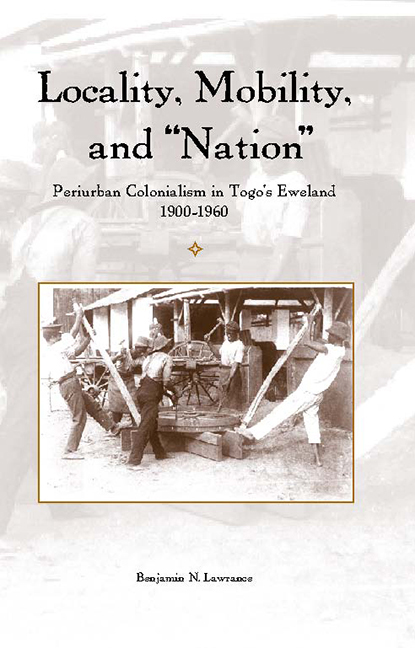Book contents
- Frontmatter
- Dedication
- Contents
- List of Illustrations
- Preface
- Notes on Orthography
- Map
- Introduction: Conceptualizing Periurban Colonialism in Sub-Saharan Africa
- 1 Mobility, Locality, and Ewe Identity in Periurban Eweland
- 2 Intervention and Dissent: Manufacturing the Model Periurban Chief
- 3 Crisis in an Ewe “Capital”: The Periurban Zone Descends on t he City
- 4 Vodou and Resistance: Politico-Religious Crises in t he Periurban Landscape
- 5 The German Togo-Bund and the Periurban Manifestations of “Nation”
- 6 From Eweland to la République Togolaise: Le Guide du Togo and the Periurban Circulation of Knowledge
- Epilogue
- Notes
- Bibliography
- Index
- Frontmatter
- Dedication
- Contents
- List of Illustrations
- Preface
- Notes on Orthography
- Map
- Introduction: Conceptualizing Periurban Colonialism in Sub-Saharan Africa
- 1 Mobility, Locality, and Ewe Identity in Periurban Eweland
- 2 Intervention and Dissent: Manufacturing the Model Periurban Chief
- 3 Crisis in an Ewe “Capital”: The Periurban Zone Descends on t he City
- 4 Vodou and Resistance: Politico-Religious Crises in t he Periurban Landscape
- 5 The German Togo-Bund and the Periurban Manifestations of “Nation”
- 6 From Eweland to la République Togolaise: Le Guide du Togo and the Periurban Circulation of Knowledge
- Epilogue
- Notes
- Bibliography
- Index
Summary
Sylvanus Olympio defeated Nicolas Grunitzky at the ballot box in 1958 and became prime minister. He supervised decolonization negotiations, and on April 27, 1960, became the first president of the Republic of Togo. Olympio engineered significant constitutional changes, however, and the new constitution, born of referendum, has been described as having all the powers of a U.S. presidency and all the weaknesses of Parliament in the French Fifth Republic. After independence Olympio's political trajectory and technique changed markedly. Authoritarianism and paternalism became the order of the day. His personal political goals clashed with those of the Togolese nation and the population as a whole. The most obvious example of this was the widening gulf between Juvento, the youth wing of the CUT, and the CUT proper. Juvento had established itself as an independent party in 1959 (with its own paper, Negrata). After independence, however, Olympio criticized the Juvento leadership as subversive and disloyal and imprisoned many of its most prominent members. Olympio felt altogether in the shadow of Ghana's president, Kwame Nkrumah, and a clash over the integration of Togo within a greater Ghana led to the closing of the Ghana-Togo border. Further examples of Olympio's departure in style include the lack of attention given to northern leaders and northern concerns, the impact of the border closure on Lomé commerce, the pressures of taxation on cocoa producers, and a clash with the Catholic archbishop in Lomé.
The change in personal style in 1961–62 mirrored an intensified drive against all organized political opposition. Leaders of other parties and internal threats were imprisoned for alleged plots, opposition parties were disqualified from standing in elections, and excessively strict electoral laws provided the means for political leverage. This political despotism culminated in 1962 with the creation of a one-party state under which all parties were banned except the CUT. The political terror of 1962 coincided with the first serious financial test of the former French colony's internal economy.
- Type
- Chapter
- Information
- Locality, Mobility, and "Nation"Periurban Colonialism in Togo's Eweland, 1900–1960, pp. 179 - 182Publisher: Boydell & BrewerPrint publication year: 2007

